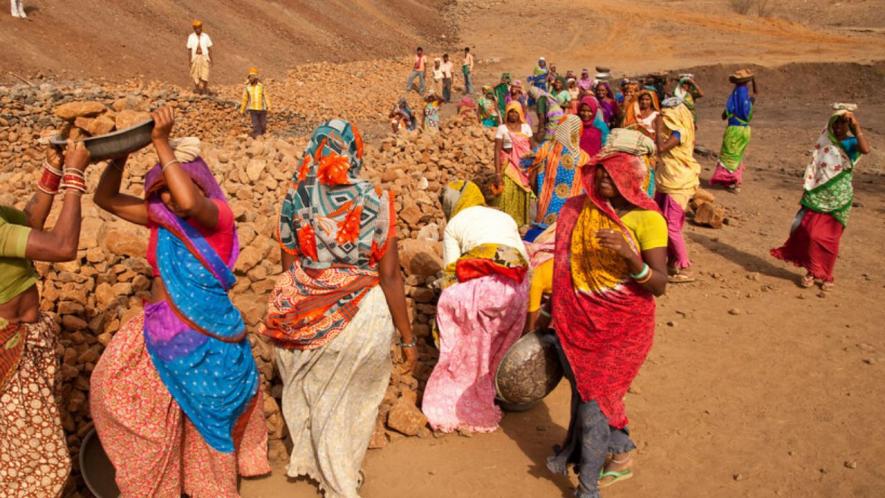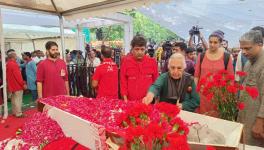'NREGA Workers' Rights Being Compromised': Brinda Karat Writes to Union Minister Giriraj Singh

Representational image | Image courtesy: Flickr
Delhi: Brinda Karat, Politburo member of the Communist Party of India (Marxist) [CPI(M)] wrote a letter to Union Minister of Rural Development Giriraj Singh to draw his attention to the “negative impact” of several central policy decisions regarding the Mahatma Gandhi National Rural Employment Guarantee Act 2005 or MGNREGA.
The Act aims to provide livelihood security to households in rural areas of India by providing at least one hundred days of work.
Karat wrote in her letter, “As one who was actively involved in the finalisation of the Act and the clauses regarding the rights of workers, it is a matter of deep concern that workers’ rights for demand-based work are being compromised. The fund allocation is woefully inadequate.” She pointed out that according to the data on the Ministry’s website, 91% of the funds allocated have been already spent.
She urged Singh to take heed of the issues raised in the letter and take appropriate action.
Currently, the average workdays have plummeted to a dismal 35.4 days. In this dire scenario, the plight of MGNREGA workers looms large. Furthermore, mandatory requirements like online attendance registration at worksites and Aadhaar-based payments are transforming the originally unconditional rights enshrined in the law into constrained access for job card holders, the Left leader said.
This year, the central government introduced two significant measures concerning MGNREGA. First, in January, it mandated the use of NMMS (National Mobile Monitoring System) for worker attendance, a move that ignited widespread protests among NREGA workers, who demonstrated for 100 days at Delhi’s Jantar Mantar. Second, the government implemented an Aadhaar-based Payment System (ABPS) in MGNREGA. Under the ABPS system, workers must link their job cards with their Aadhaar cards and bank accounts, and they need to register with the National Payments Corporation of India (NPCI) mapper.
Currently, government data reveals that the NREGA workforce consists of 14.41 crore active workers, with 11.60 crore meeting the eligibility criteria established by ABPS.
“The introduction of Aadhaar-linked payments of wages has not resulted in much change in timely payment of wages. In June, the government, in a press release from PIB had assured that the Ministry was not insisting on an Aadhaar-enabled system of payment but on an Aadhaar-based payment system (ABPS), which would be more flexible,” she noted, adding that of total 26 crore job holders, 41.1% are not yet eligible for this payment mode. Citing a recent report in The Hindu in this regard, she said that across five states with the largest number of active NREGA job holders, 1.2 crore workers will be ineligible for payments due to not having ABPS accounts.
“While so far there is no significant benefit, there is certainly evidence of significant losses for workers,” Karat wrote.
Mentioning that she had visited MGNREGA work sites in the last six months and interacted with workers, she noted that workers raised a common complaint about the introduction of the attendance system through online registrations at the worksite. “Given that the connectivity is very poor in vast areas of rural India, particularly in remote tribal areas, mandatory online registration is leading to great difficulties for the workers,” Karat’s letter said. This has disproportionally affected women workers who comprise the bulk of the MGNREGA workforce.
“There are also examples of attendance not getting registered leading to denial of wages,” she said.
“In the current situation as far as women’s work norms are concerned MGNREGA sites are illustrations of the extraction of female labour at low rates to create public assets,” Karat said.
She also pointed out that there is an urgent need for the Ministry to initiate a time-use survey on MGNREGA sites. Previously, work norms for women were decided in many states after such surveys.
Get the latest reports & analysis with people's perspective on Protests, movements & deep analytical videos, discussions of the current affairs in your Telegram app. Subscribe to NewsClick's Telegram channel & get Real-Time updates on stories, as they get published on our website.
























